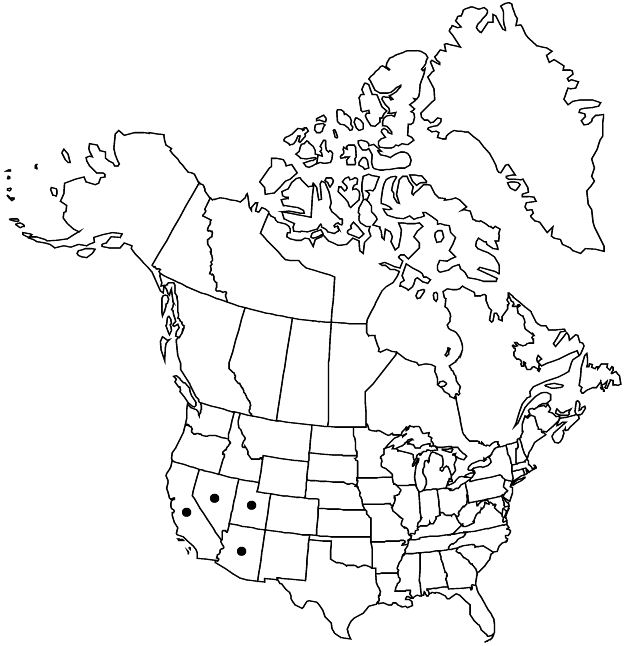Difference between revisions of "Prunus fasciculata"
Proc. Amer. Acad. Arts 10: 70. 1874.
FNA>Volume Importer |
FNA>Volume Importer |
||
| Line 20: | Line 20: | ||
}}<!-- | }}<!-- | ||
| − | --><span class="statement" id="st-undefined" data-properties=""><b>Shrubs,</b> suckering, much branched, 10–20(–30) dm, thorny. <b>Twigs</b> with axillary end buds, glabrous or canescent. <b>Leaves</b> deciduous; sessile; blade oblanceolate to linear, 0.5–2 × 0.1–0.2(–0.4) cm, base long-attenuate, margins nearly entire or obscurely and remotely serrulate in distal 1/3, teeth blunt to sharp, sometimes glandular, apex rounded to acute, surfaces puberulent or glabrous or low-papillate (var. punctata). <b>Inflorescences</b> solitary flowers or 2-flowered fascicles. <b>Pedicels</b> 0–4 mm, glabrous. <b>Flowers</b> unisexual, plants dioecious, blooming at leaf emergence; hypanthium campanulate, 1.5–3 mm, glabrous externally; sepals erect-spreading, triangular, 0.7–1 mm, margins entire, surfaces glabrous; petals white to yellowish, elliptic, obovate, or suborbiculate, 1.4–2.5(–4) mm; ovaries hairy. <b>Drupes</b> gray to red-brown, ovoid, ± compressed, 7–15 mm, densely puberulent; hypanthium tardily deciduous; mesocarps leathery to dry; stones ovoid, ± flattened.</span><!-- | + | --><span class="statement" id="st-undefined" data-properties=""><b>Shrubs,</b> suckering, much branched, 10–20(–30) dm, thorny. <b>Twigs</b> with axillary end buds, glabrous or canescent. <b>Leaves</b> deciduous; sessile; blade oblanceolate to linear, 0.5–2 × 0.1–0.2(–0.4) cm, base long-attenuate, margins nearly entire or obscurely and remotely serrulate in distal 1/3, teeth blunt to sharp, sometimes glandular, apex rounded to acute, surfaces puberulent or glabrous or low-papillate (<i></i>var.<i> punctata</i>). <b>Inflorescences</b> solitary flowers or 2-flowered fascicles. <b>Pedicels</b> 0–4 mm, glabrous. <b>Flowers</b> unisexual, plants dioecious, blooming at leaf emergence; hypanthium campanulate, 1.5–3 mm, glabrous externally; sepals erect-spreading, triangular, 0.7–1 mm, margins entire, surfaces glabrous; petals white to yellowish, elliptic, obovate, or suborbiculate, 1.4–2.5(–4) mm; ovaries hairy. <b>Drupes</b> gray to red-brown, ovoid, ± compressed, 7–15 mm, densely puberulent; hypanthium tardily deciduous; mesocarps leathery to dry; stones ovoid, ± flattened.</span><!-- |
-->{{Treatment/Body | -->{{Treatment/Body | ||
| Line 59: | Line 59: | ||
|publication year=1874 | |publication year=1874 | ||
|special status= | |special status= | ||
| − | |source xml=https://jpend@bitbucket.org/aafc-mbb/fna-data-curation.git/src/ | + | |source xml=https://jpend@bitbucket.org/aafc-mbb/fna-data-curation.git/src/8f726806613d60c220dc4493de13607dd3150896/coarse_grained_fna_xml/V9/V9_605.xml |
|subfamily=Rosaceae subfam. Amygdaloideae | |subfamily=Rosaceae subfam. Amygdaloideae | ||
|tribe=Rosaceae tribe Amygdaleae | |tribe=Rosaceae tribe Amygdaleae | ||
Revision as of 18:17, 18 September 2019
Shrubs, suckering, much branched, 10–20(–30) dm, thorny. Twigs with axillary end buds, glabrous or canescent. Leaves deciduous; sessile; blade oblanceolate to linear, 0.5–2 × 0.1–0.2(–0.4) cm, base long-attenuate, margins nearly entire or obscurely and remotely serrulate in distal 1/3, teeth blunt to sharp, sometimes glandular, apex rounded to acute, surfaces puberulent or glabrous or low-papillate (var. punctata). Inflorescences solitary flowers or 2-flowered fascicles. Pedicels 0–4 mm, glabrous. Flowers unisexual, plants dioecious, blooming at leaf emergence; hypanthium campanulate, 1.5–3 mm, glabrous externally; sepals erect-spreading, triangular, 0.7–1 mm, margins entire, surfaces glabrous; petals white to yellowish, elliptic, obovate, or suborbiculate, 1.4–2.5(–4) mm; ovaries hairy. Drupes gray to red-brown, ovoid, ± compressed, 7–15 mm, densely puberulent; hypanthium tardily deciduous; mesocarps leathery to dry; stones ovoid, ± flattened.
Distribution

sw United States, nw Mexico.
Discussion
Varieties 2 (2 in the flora).
Selected References
None.
Key
| 1 | Leaf blades sparsely to densely puberulent, not papillate. | Prunus fasciculata var. fasciculata |
| 1 | Leaf blades glabrous, sometimes papillate. | Prunus fasciculata var. punctata |